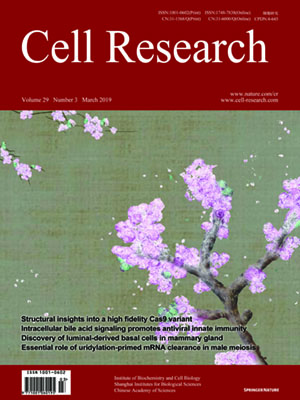
Volume 29, No 3, Mar 2019
ISSN: 1001-0602
EISSN: 1748-7838 2018
impact factor 17.848*
(Clarivate Analytics, 2019)
Volume 29 Issue 3, March 2019: 193-205
ORIGINAL ARTICLES
Virus-induced accumulation of intracellular bile acids activates the TGR5-β-arrestin-SRC axis to enable innate antiviral immunity
Ming-Ming Hu 1,2,3, Wen-Rui He 2, Peng Gao 2, Qing Yang 2, Ke He 4, Li-Bo Cao 5, Shu Li 1,2, Yu-Qi Feng 4 and Hong-Bing Shu 1,2
1Department of Infectious Diseases, Zhongnan Hospital of Wuhan University, Wuhan 430071, China; 2Medical Research Institute, School of Medicine, Wuhan University, Wuhan 430071, China; 3State Key Laboratory of Virology, Wuhan University, Wuhan 430072, China; 4College of Chemistry and Molecular Sciences, Wuhan University, 430072 Wuhan, China and 5College of Life Sciences, Wuhan University, Wuhan 430072, China
Correspondence: Ming-Ming Hu (mmhu@whu.edu.cn) or Hong-Bing Shu (shuh@whu.edu.cn)
The mechanisms on metabolic regulation of immune responses are still elusive. We show here that viral infection induces immediate-early NF-κB activation independent of viral nucleic acid-triggered signaling, which triggers a rapid transcriptional induction of bile acid (BA) transporter and rate-limiting biosynthesis enzymes as well as accumulation of intracellular BAs in divergent cell types. The accumulated intracellular BAs activate SRC kinase via the TGR5-GRK-β-arrestin axis, which mediates tyrosine phosphorylation of multiple antiviral signaling components including RIG-I, VISA/MAVS, MITA/STING, TBK1 and IRF3. The tyrosine phosphorylation of these components by SRC conditions for efficient innate antiviral immune response. Consistently, TGR5 deficiency impairs innate antiviral immunity, whereas BAs exhibit potent antiviral activity in wild-type but not TGR5-deficient cells and mice. Our findings reveal an intrinsic and universal role of intracellular BA metabolism in innate antiviral immunity.
https://doi.org/10.1038/s41422-018-0136-1
FULL TEXT | PDF
Browse 1213


